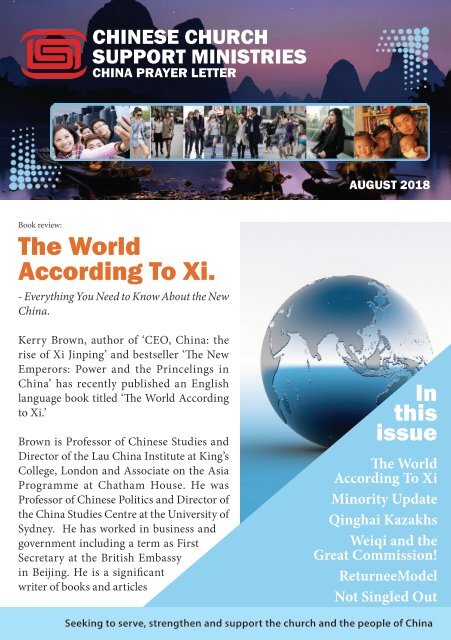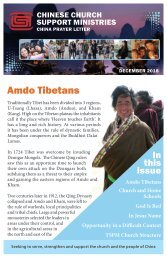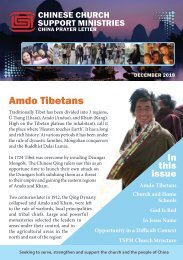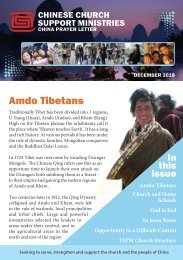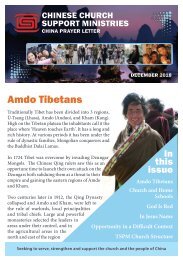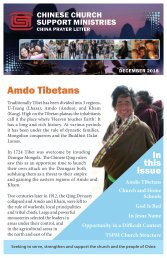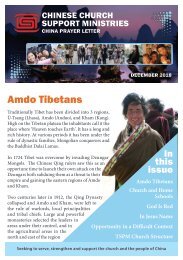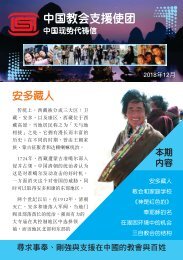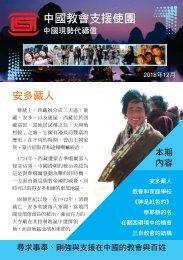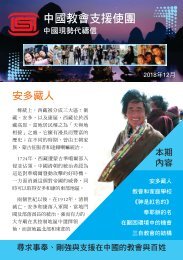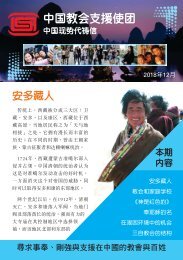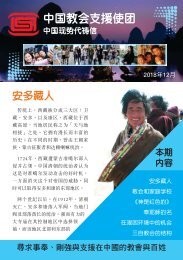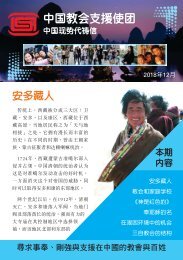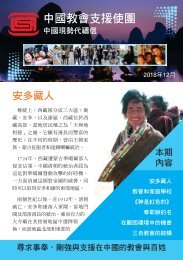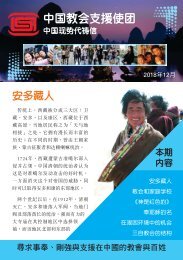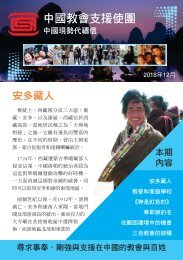PU_UK_web
Create successful ePaper yourself
Turn your PDF publications into a flip-book with our unique Google optimized e-Paper software.
CHINESE CHURCH<br />
SUPPORT MINISTRIES<br />
CHINA PRAYER LETTER<br />
AUGUST 2018<br />
Book review:<br />
The World<br />
According To Xi.<br />
- Everything You Need to Know About the New<br />
China.<br />
Kerry Brown, author of ‘CEO, China: the<br />
rise of Xi Jinping’ and bestseller ‘The New<br />
Emperors: Power and the Princelings in<br />
China’ has recently published an English<br />
language book titled ‘The World According<br />
to Xi.’<br />
Brown is Professor of Chinese Studies and<br />
Director of the Lau China Institute at King’s<br />
College, London and Associate on the Asia<br />
Programme at Chatham House. He was<br />
Professor of Chinese Politics and Director of<br />
the China Studies Centre at the University of<br />
Sydney. He has worked in business and<br />
government including a term as First<br />
Secretary at the British Embassy<br />
in Beijing. He is a significant<br />
writer of books and articles<br />
In<br />
this<br />
issue<br />
The World<br />
According To Xi<br />
Minority Update<br />
Qinghai Kazakhs<br />
Weiqi and the<br />
Great Commission!<br />
ReturneeModel<br />
Not Singled Out<br />
Seeking to serve, strengthen and support the church and the people of China
2<br />
o n C h i n a ’s<br />
economy and<br />
politics.<br />
His new book,<br />
T h e Wo r l d<br />
According to<br />
Xi, looks at<br />
the political<br />
and economic<br />
environment in<br />
which Xi Jinping’s career was developed.<br />
From his family background and<br />
traumatic first-hand experience of the<br />
Mau era through to his political journey<br />
to become the World’s most influential<br />
and powerful leader.<br />
Xi is portrayed as a Party man through<br />
and through. Brown discusses the strong<br />
motivation Xi has to assert the primacy<br />
of the Party, reinforce Party loyalty and<br />
remove tribalism and factionalism.<br />
Brown states, “Much of Xi’s campaign has<br />
been based on strengthening institutions<br />
and procedures, and creating a sense of<br />
predictability.”<br />
This book relates many of the key factors<br />
and historical events that have shaped<br />
the worldview of the Chinese, the Party<br />
and Xi Jinping. Brown reflects on some<br />
the greatest challenges met by Xi’s<br />
predecessors and the lessons<br />
learned from their very<br />
distinct styles of<br />
leadership.<br />
He depicts the conditions in which<br />
Xi Jinping currently leads the nation.<br />
Externally, China is now often at the<br />
driving seat of world politics. Internally<br />
it is dealing with the new bourgeoisie<br />
and market forces. This book considers<br />
how socialism has been compelled to<br />
modernise and adapt.<br />
Brown expounds the heart of what many<br />
in the West see as a somewhat harsh and<br />
unbending administration.<br />
He writes, “This is because Xi is the<br />
inheritor of the Party’s commitment<br />
from its very beginning to use whatever<br />
means necessary to ensure that China,<br />
with its searing history of suffering,<br />
victimisation, and colonial bullying<br />
at the hands of outsiders, would never<br />
return to this state of vulnerability.”<br />
Xi’s plans to make China great and<br />
respected in the World are welcomed<br />
by his people. This book looks at how<br />
Xi’s national rejuvination and bold and<br />
far reaching global policies are achieving<br />
this while balancing market forces with<br />
state control.<br />
Brown points out that by 2021 when<br />
the CPC celebrates its Centenary the<br />
historic mission for China to achieve<br />
middle income status will have been<br />
accomplished.<br />
This book is an essential read for anyone<br />
who wants to understand more about the<br />
man and the political nature of China.<br />
Ultimately the contemporary world
is connected to Xi’s success or failure. A<br />
man who has obtained the status whereby<br />
his very thoughts have been added<br />
into China’s Constitution. A country<br />
that nearly every nation in the world<br />
depends on for trade. No doubt China’s<br />
new position of power is challenging and<br />
even threatening. Few can elucudate the<br />
current circumstances with as much<br />
broad insight and knowledge as Kerry<br />
Minorities Update<br />
A National Office Director and regular<br />
China visitor writes:<br />
After this I looked, and behold, a great<br />
multitude that no one could number,<br />
from every nation, from all tribes and<br />
peoples and languages, standing before<br />
the throne and before the Lamb, clothed<br />
Brown.<br />
International<br />
Short-Term<br />
Teams<br />
Although religion in China is only briefly<br />
mentioned, Brown does give the reader a<br />
good overview of the motivation behind<br />
Xi’s policies toward religion. For someone<br />
wanting a broad and comprehensive<br />
understanding of Xi Jinping’s China this<br />
book will be in an indispensable read.<br />
in white robes, with palm branches in<br />
their hands, and crying out with a loud<br />
voice, “Salvation belongs to our God who<br />
sits on the throne, and to the Lamb!”<br />
Amen. (Rev. 7:9-10)<br />
We have, over the last 12 months, featured<br />
a number of articles about the minority<br />
**<br />
Cycle<br />
**<br />
Mercy<br />
**<br />
Medical<br />
**<br />
Intercession<br />
**<br />
English Cultural Exchange<br />
August 2018 Medical Team<br />
September 2018 Trekking & Intercession Team<br />
October 2017 Cycle Team; Mercy Team<br />
December 2017 Cultural Exchange Team<br />
3
4<br />
people groups of China. The Bonan, the<br />
Bai, Wa and the Mang etc.<br />
There is a good reason for this.<br />
A high percentage of missionaries to<br />
China have been called to these often<br />
isolated people groups. Some have seen<br />
spectacular success like the amazing<br />
story of JO Frazer and the Lisu people.<br />
The fruit of this is obvious today as<br />
there are estimated to be over 300,000<br />
Lisu believers out of a total population<br />
of around 1 million.<br />
Other minorities like the Muslim<br />
Dongxiang, who live in an arid region<br />
both geographically and spiritually,<br />
have strongly resisted Christianity.<br />
Operation China noted that up to the<br />
year 2000 “there has never been a single<br />
known church or Christian among the<br />
Dongxiang.”<br />
But they are a much-loved people – many<br />
of our own workers and colleagues have<br />
this people group on their hearts and<br />
have seen striking miracles that give<br />
them great encouragement for the future.<br />
Other workers have been drawn strongly<br />
to different minority people. Such<br />
ministry evokes strong passions. I can<br />
never forget the tearful appeal from a<br />
Korean missionary colleague - asking me<br />
to find workers for his special people –<br />
China’s largest minority, the Zhuang. A<br />
truly desperate cry from the heart.<br />
Another colleague is so passionate<br />
about the Tibetan people that he has<br />
added a clause to his will that his ashes<br />
be sprinkled in the mountains of Tibet!<br />
Of course, we all hope this is some time<br />
away!<br />
Another worker has a deep love for the<br />
Dong minority of Southern China. This<br />
love affair has led to firstly a mastering<br />
of Mandarin but now to a working<br />
knowledge of the Dong language itself.<br />
A recent team member found himself<br />
moved to his very core by a small<br />
minority group in the far North West.<br />
He will tell you it has changed his life. He<br />
cannot speak of his experiences without<br />
tears.<br />
Of course, all of us who work in this<br />
ministry have a love for the whole<br />
nation of China – 91+% of whom are<br />
Han Chinese.<br />
But it is the minorities (55 officially<br />
excluding Han) but actually 490<br />
according to Operation China, who are<br />
under-served in resource and outreach.<br />
A number of our own team members in<br />
the past have become acquainted with<br />
the Maonan people. Whilst they have<br />
technology and some autonomy, they<br />
do not have the scriptures in their own<br />
language. There are just a small number<br />
of Maonan converts – way less than 1%.<br />
And this is the case for the majority of<br />
the minority!<br />
Please join with us in bringing these<br />
diverse people before His throne and ask<br />
for more workers for the harvest fields of<br />
remote China.
Qinghai<br />
Kazakhs<br />
Amongst the official Kazakh Minority<br />
Group of China there is a group that<br />
differs from other Kazakh communities.<br />
The Qinghai Kazakhs live in Qinghai<br />
Province and speak a language<br />
distinct from China’s other Kazahk<br />
groups of which the majority live in<br />
the Xinjiang Autonomous Region.<br />
Although originally from Xinjiang, the<br />
Qinghai Kazakhs fled their homeland<br />
in the Barikol mountains during a<br />
turbulent time in the regions’ history.<br />
During the 1930’s a warlord named<br />
Sheng Shicai ruled in Northern<br />
Xinjiang. This Manchurian born leader<br />
was affiliated with the Kuomintang<br />
but solicited support from his Russian<br />
neighbours to secure his power. In return<br />
Russia was given access to the region’s<br />
oil and minerals. With help from the<br />
Kremlin Sheng destroyed his enemy’s<br />
armies and shortly afterwards executed<br />
or imprisoned any rivals and dissidents<br />
(or prospective dissidents) in the Great<br />
Purge of 1936. When Russia found itself<br />
under financial pressure from WWII<br />
Sheng now requested “donations” of<br />
sheep and cattle from his subjects<br />
to repay the Kremlin for its ongoing<br />
support and to maintain his governance.<br />
In response to the Sheng’s Great Purge<br />
and the requisitions of their livestock<br />
approximately 10, 000 (some estimates<br />
say 30,000) Barikol Kazaks, a nomadic<br />
people, fled east to Gansu and Qinghai<br />
provinces. Rather than finding refuge<br />
there, they were robbed and killed by<br />
the local Chinese Muslim warlord Ma<br />
Bufang. Ma also encouraged discord<br />
between the local Mongolians and<br />
Tibetans and the fleeing Kazaks,<br />
causing further fighting. Of the masses<br />
that left only 135 Kazaks survived.<br />
The descendents of this remnant<br />
set down roots and grew in number<br />
to reach about 1500 in 1954.<br />
In 1963, the prefecture was<br />
renamed “Haixi Mongol Tibetan<br />
Kazakh Autonomous Prefecture,<br />
adding Kazakh to the title in<br />
recognition of the growing numbers.<br />
Many lived in a commune near Golmud<br />
City where they used to winter. The<br />
rest of the year they moved off to seek<br />
out pastures for their sheep and goats,<br />
horses, cattle and camels, living a seminomadic<br />
lifestyle in yurts. The Kazakh<br />
name means “wanderer”. Kazakhs<br />
are well known for their horse skills<br />
and Qinghai Kazakh’s are partial to<br />
an alcoholic drink called kumyss<br />
made from mare’s milk. The bride<br />
5
Kazakhs returned to their original<br />
homeland in Xinjiang. Once again, the<br />
prefecture was renamed Haixi Mongol<br />
and Tibetan Autonomous Prefecture,<br />
removing Kazakh from the title.<br />
price for a wife was often paid in horses.<br />
Despite being known as Sunni Muslims<br />
the Qinghai Kazakhs also practice<br />
animism and ancestor worship. Without<br />
the Qu’ran, teachers and mosques,<br />
their Muslim faith became diminished.<br />
In the 1980’s a series of events<br />
dramatically affected the Kazakh<br />
population in Qinghai. China ruled<br />
that communes were to be dissolved<br />
in 1983 and the nomadic subsistence<br />
style of farming the Kazakhs preferred<br />
for most of the year was changed to<br />
grazing allotments<br />
to better protect the<br />
pastureland grass<br />
species. Also, the<br />
newly independent<br />
Kazakhstan invited<br />
Kazakh people<br />
from China to<br />
repatriate. China<br />
agreed to let<br />
them go. But the<br />
majority of Qinghai<br />
6<br />
But the passion for holding onto<br />
their nomadic farming lifestyle was<br />
being eroded by the increasing lure<br />
of education and medical provision<br />
for their children, a warm house and<br />
satellite TV. Soon after their departure,<br />
in the spring of 1985, some of them<br />
re-migrated to the Golmud area of<br />
Qinghai, and eventually were helped<br />
settle down by the local government<br />
in the purpose-built Mahai Village in<br />
Haixi Prefecture of Qinghai, while a<br />
minority of them moved to Kaiganqi<br />
Township of Xinjiang. This made Mahai<br />
the only Kazak village of Qinghai, and<br />
its population was 484 by April 2014.<br />
Today the Kazaks of Qinghai<br />
remain a completely untouched<br />
group and have no knowledge<br />
whatsoever of Christ or the gospel.
PRAYER POINTERS<br />
The World According To Xi<br />
Pray for better understanding between the East and West<br />
Pray that the Father will surround Xi Jinping with godly and righteous advisors.<br />
Pray that God will soften the heart of Xi Jinping to Christian believers and allow<br />
him to see them as a blessing and not a threat.<br />
Thank God for this period of economic growth and stability in China’s history.<br />
Cut out this note and slip it into your Bible to help you remember the August prayer topics for China<br />
Pray that God will prepare and raise up a successor to follow Xi that will honour<br />
His name.<br />
Minorities Update<br />
Ask God to move in a mighty way in China, the world’s most populous nation.<br />
Pray for translation work to move forward for the many people groups who have<br />
no Bibles.<br />
Pray for more workers to help bring in the harvest – that in the most remote area<br />
the name of Jesus will be declared!<br />
Ask God to place one of these minorities on your heart that prayers on their behalf<br />
will go up around the world.<br />
Qinghai Kazakhs<br />
Pray that the Kazakh people group that has suffered so terribly finds peace and the<br />
ablity to forgive those that have mistreated them.<br />
Pray that they can adapt to the times and their changing environment. Pray that<br />
they can find meaningful and fulfilling work to replace the loss of their historic<br />
nomadic lifestyle.<br />
Pray that the Father will send someone to them to demonstrate his passionate love<br />
for them.<br />
7
PRAYER POINTERS<br />
Weiqi and the Great Commission!<br />
Pray for well thought out strategies that will allow Christians in China to live at peace<br />
but all the while advancing the Great Commission.<br />
Pray that local church leaders will be as shrewd as snakes but as innocent as doves.<br />
Pray that as we better understand Chinese culture we will use this knowledge to help<br />
present the Gospel and show Christ’s love in the most effective way.<br />
Returnee Model<br />
Thank God for the foundation of unity and collaboration in the Returnee Model<br />
project.<br />
Ask God to continue to bring his revelation and creativeness to the project.<br />
Pray that the model will be adaptable under the current restricted climate.<br />
Not Singled Out<br />
Pray that the crackdown will not be prolonged.<br />
Thank God that he can use periods of tribulation to refine and strengthen his people.<br />
Pray that God’s people will be able to remain good witnesses for him despite the<br />
persecution<br />
Pray that God will bless those that stand true to him and his Word.<br />
Chinese Church Support Ministries<br />
Seeking to serve, strengthen<br />
and support the church and<br />
the people of China<br />
8
Weiqi and the<br />
Great Commission!<br />
An ancient and revered book in China is<br />
compulsory reading at the US Department<br />
of State! The book is surprisingly well<br />
known to international politicians and<br />
military leaders. Written around 500<br />
BC, it is called “The Art of War” (Sunzi<br />
Bingfa) by Sun Tzu - more commonly<br />
known in China as Sunzi. The master<br />
strategist’s most famous line is well<br />
known in the West – “Know the enemy<br />
and know yourself, in a hundred battles<br />
you will never be in peril”.<br />
Chinese leaders throughout history have<br />
developed military strategies based on<br />
this book (including recent leaders). The<br />
strategy features long term goals, patience,<br />
deception and doing the unexpected to<br />
unsettle opponents.<br />
One chapter of Sunzi Bingfa, discusses an<br />
even older concept known as shi.<br />
A high-level US Government Report<br />
in 2002 wrote: “There is no Western<br />
equivalent to the concept of “shi”. Chinese<br />
linguists explain it as “the alignment of<br />
forces … that a skilled strategist can<br />
exploit to ensure victory over a superior<br />
force.”<br />
A key aspect of shi is that it needs to be<br />
practised and mastered in peacetime. It<br />
is always carefully crafted so the end aim<br />
is not always clear and obvious.<br />
One way that<br />
non-Chinese can<br />
gain an understanding<br />
of the strategies of shi<br />
would be to learn to play the<br />
classic Chinese board game – the<br />
oldest board game in the world called<br />
weiqi. Played on a square grid with 19<br />
intersecting points along each axis, weiqi<br />
involves two players taking turns placing<br />
white or black stones (all of equal value)<br />
on the grid. The goal is to surround and<br />
capture enemy stones, dominating the<br />
board. A single game can take two days!<br />
The strategies used in the game are being<br />
replicated in many current projects and<br />
strategies of the PRC. Their great respect<br />
for history and culture shape national and<br />
international policy. For example, shi and<br />
weiqi principles are evident in China’s<br />
massive foreign investment and the One<br />
Belt One Road Programme. You could<br />
say it can all be seen on the board!<br />
Christians too have a master strategy. It<br />
is called the Great Commission. Like shi,<br />
it dates back thousands of years! Like The<br />
Art of War it is seemingly ageless and<br />
remains as applicable now as it was when<br />
first written down. Other comparisons<br />
are striking!<br />
Christians have a long-term goal. Peter<br />
wrote:<br />
9
“The Lord is not slow in keeping his<br />
promise, as some understand slowness.<br />
Instead he is patient with you, not<br />
wanting anyone to perish, but everyone<br />
to come to repentance.”<br />
All involved in cross cultural mission<br />
know the need for patience. Robert<br />
Morrison and Hudson Taylor spent<br />
years of fruitless ministry before the<br />
floodgates opened!<br />
Jesus knew we would need<br />
to have a degree of cunning:<br />
“I am sending you out like sheep among<br />
wolves. Therefore, be as shrewd as<br />
snakes and as innocent as doves.<br />
Finally, to execute the Great<br />
Commission, we often have to do the<br />
unexpected. And the message of the<br />
gospel is frequently unsettling!<br />
China is a land rooted in culture<br />
and long-established strategies. It is<br />
incumbent upon all who are called there<br />
to understand as much as possible of<br />
the cultural complexity that underlies<br />
every policy, proclamation and action.<br />
In doing so we too are better prepared<br />
to refine our own strategy to proclaim<br />
Jesus in China. It has been a long game<br />
to date, but patience is producing great<br />
fruit in China!<br />
Returnee Model<br />
The opening up of China has given<br />
many young Chinese the opportunity to<br />
study in foreign countries. Rev. Patrick<br />
So, Senior Pastor of EFCC Yanfook<br />
Church made the following observation:<br />
are failing to meet the needs of these<br />
“returnees” the Return to China<br />
Partnership (RTCP), together with<br />
others, has conducted a study to<br />
identify why the losses are so high.<br />
“Every year China has several<br />
hundred thousand students studying<br />
abroad. Among them, quite a number<br />
become believers in Christ while<br />
overseas. However, unfortunately,<br />
when they return to China, less than<br />
20% continue going to church for<br />
worship and Bible study. We are losing<br />
almost 80% of Christian returnees!”<br />
The aim is to help more returnees retain<br />
and grow in their faith, integrate into<br />
the Chinese Christian community, and<br />
serve the Chinese church.<br />
RTCP, heading up his collaboration<br />
project, has identified three major<br />
issues that impact returnees:<br />
10<br />
In order to help the Chinese<br />
Churches, find out where they<br />
1. Pre-Return Preparation<br />
The purpose of pre-return preparation
is to raise returnees’ awareness of the<br />
potential problems and conflicts they are<br />
likely to face upon their return to their<br />
homeland. The aim is to equip Christian<br />
believers to cope with the challenges of<br />
practicing their faith once they are back<br />
home.<br />
After encountering God in a foreign<br />
country, the young people often return<br />
home to meet problems on many fronts.<br />
They may struggle at work, in the family,<br />
and with marriage and friendships.<br />
Most may not be able to handle the<br />
controversies these matters entail or<br />
navigate between the world’s values<br />
and those of Christianity—holding on<br />
to their new beliefs. A great number of<br />
these new believers fall away as a result.<br />
2. Discipleship training<br />
Discipleship training helps returnee<br />
believers develop a deeper relationship<br />
with Jesus, gain a better understanding<br />
of the in-depth reason for salvation and,<br />
for those with a serving heart, be trained<br />
to become disciple-makers.<br />
3. Referral systems<br />
Referral Systems are for connecting new<br />
returnees to an experienced returnee<br />
who is already in the place to which they<br />
are to return. This person is able and<br />
ready to guide and help them adjust to<br />
their new situation, so they can continue<br />
to grow in Christ.<br />
To study each of these three issues,<br />
RTCP formed three Mini Consultation<br />
Committees. They have consulted with a<br />
variety of returnee ministries to identify<br />
which of their various methods and<br />
strategies are returning “critical success<br />
factors” in each of the three areas. The<br />
knowledge they have collected has been<br />
used to construct a model that others<br />
can follow.<br />
RTCP facilitated two returnee groups,<br />
Group A in 2015, and Group B in<br />
2016. Both groups are being developed<br />
according to the model’s principles<br />
and methods. CCSM will look at the<br />
structure of these models in more detail<br />
in the next issue.<br />
[From the series ‘Key Issues Impacting<br />
Returnees’, China Source]<br />
11
Not Singled Out<br />
Like a parent trying to regain control<br />
of an unruly teenager, China has<br />
begun a period of “tough love” in a<br />
bid to rein in their delinquents….<br />
that is all those who have pushed the<br />
Chinese Communist Party’s boundaries<br />
after a period of relative freedom.<br />
The current stability of China under the<br />
China Communist Party (CCP) depends<br />
expressly on its ability to maintain<br />
undivided control over the vast and<br />
diverse nation. In recent times the nation<br />
has become more open to the influences<br />
of the West and more affluent as a society.<br />
Many of the core CCP limits across the<br />
political, civil and religious spectrum have<br />
become lax. Officials have turned a blind<br />
eye to minor infractions and boundaries<br />
have become somewhat stretched.<br />
Politicians were lining the pockets of<br />
their families, companies were sidestepping<br />
environmental and business<br />
regulations, schools and universities have<br />
become more open to foreign influence,<br />
officials were only loosely enforcing<br />
regulations, lawyers were taking up civil<br />
rights cases against the government,<br />
activists were becoming more outspoken<br />
on the internet soapbox and religious<br />
organisations were multiplying outside<br />
the perimeters of their carefully monitored<br />
regulatory confines and a few protests<br />
had escalated even to acts of terrorism.<br />
The current crackdown on the church and<br />
religion is only one facet of a national bid<br />
to reassert CCP control. They have come<br />
down hard with a zero-tolerance policy.<br />
All Chinese citizens must fall back in line.<br />
For Christians that means only exercising<br />
their religion within party restrictions,<br />
Bibles cannot be sold online, and many<br />
Christian books cannot be sold because<br />
they have not been assigned an official<br />
IBAN number, groups cannot meet, even<br />
for prayer, without the oversight of an<br />
authorised leader in an approved location.<br />
The list of regulations is extensive.<br />
However, the crackdown is not<br />
exclusive to the Church. They are<br />
not being singled out. Even so, this<br />
does not alleviate the pain and very<br />
real suffering they are experiencing.<br />
12<br />
CCSM <strong>UK</strong><br />
PO Box 3815<br />
Chester, CH1 9BE<br />
T: (01244) 677 599<br />
National Director: Martyn Wells<br />
uk@amccsm.org<br />
www.amccsm.org


